California's casino industry maintains strict background check standards through both state gaming commission oversight and tribal gaming authority regulations, requiring comprehensive screening that examines criminal history, financial records, and character references. Employment candidates should expect thorough vetting processes that can take 30-90 days depending on the position level and gaming jurisdiction.
Key Takeaways
- California casino background checks are regulated by both the California Gambling Control Commission and individual tribal gaming authorities with varying requirements.
- The screening process typically takes 30-90 days and examines criminal history, credit reports, employment verification, and character references.
- Disqualifying factors include felony convictions, gaming-related offenses, financial crimes, and associations with organized crime or prohibited persons.
- Tribal casinos operate under federal Indian Gaming Regulatory Act guidelines but may have additional screening requirements specific to their jurisdiction.
- Different gaming license categories require varying levels of background investigation, from basic employee permits to comprehensive executive licensing.
- Cost responsibilities for background checks vary by employer, with some casinos covering all fees while others require employee contribution for processing costs.
Understanding California Gaming Background Check Requirements
California's casino industry operates under a dual regulatory framework that creates comprehensive oversight for all gaming employees in 2025. The California Gambling Control Commission oversees card rooms and certain gaming facilities, while tribal casinos fall under federal jurisdiction through the Indian Gaming Regulatory Act and individual tribal gaming commissions. This regulatory structure ensures thorough screening processes across all gaming establishments statewide.
The gaming industry's focus on integrity and security drives these extensive California casino background check requirements. State-licensed facilities must comply with California Government Code Section 19857 and related regulations, which establish minimum standards for employee screening and ongoing monitoring. Additionally, tribal gaming authorities implement their own enhanced screening protocols that often exceed federal minimum requirements.
These comprehensive screening standards protect both gaming establishments and the public from potential security risks. California gaming license background check requirements have evolved significantly over the past decade, incorporating advanced database technologies and multi-jurisdictional information sharing. Furthermore, the regulatory framework continues adapting to address emerging security concerns and technological advances in the gaming industry.
State Gaming Commission Standards
The California Gambling Control Commission requires comprehensive background investigations for all gaming employees, regardless of position level. These investigations examine criminal history, financial stability, character references, and associations with known gaming violators or prohibited persons. Moreover, the commission maintains detailed databases of approved and disqualified individuals, creating a statewide network that prevents problematic employees from moving between gaming establishments.
The commission's screening process includes multi-state database searches and coordination with federal law enforcement agencies. This comprehensive approach ensures that California tribal casino background check requirements align with state standards while respecting tribal sovereignty. Consequently, the system maintains consistent application of background check standards across all state-regulated gaming facilities.
Federal Tribal Gaming Oversight
Tribal gaming facilities operate under federal oversight through the National Indian Gaming Commission, which establishes minimum background check standards for all tribal gaming employees. Individual tribes may implement additional screening requirements beyond federal minimums, creating variation in tribal casino background check processes. However, the Indian Gaming Regulatory Act requires tribal gaming commissions to conduct background investigations comparable to those required by states for similar gaming activities.
This federal framework ensures consistent baseline standards while allowing tribal sovereignty in establishing specific screening protocols. As a result, tribal gaming authorities often coordinate with federal agencies and other jurisdictions to ensure comprehensive screening coverage that identifies potential issues not visible in standard database searches.
Gaming License Categories and Background Check Levels

Different gaming positions require varying levels of background investigation, with higher-responsibility roles demanding more comprehensive screening processes in 2025. Understanding these categories helps job seekers prepare for appropriate background check expectations and timeline planning. The classification system ensures that individuals with greater access to gaming operations, cash handling, or security systems undergo more thorough screening processes.
California gaming regulators have streamlined license categories to improve processing efficiency while maintaining security standards. These updated classifications reflect modern gaming operations and technological advances in screening capabilities. Additionally, the system allows for expedited processing of certain license types while maintaining thoroughness for high-risk positions.
| License Category | Position Examples | Investigation Depth | Typical Timeline |
| Class A Executive | Gaming Managers, Key Personnel | Comprehensive Financial Review | 60-90 days |
| Class B Supervisory | Floor Supervisors, Security Chiefs | Enhanced Criminal History | 45-60 days |
| Class C Gaming Staff | Dealers, Cage Cashiers | Standard Screening | 30-45 days |
| Support Personnel | Food Service, Maintenance | Basic Background Check | 15-30 days |
The licensing structure accommodates both full-time permanent employees and temporary or seasonal workers. This flexibility helps gaming establishments manage staffing needs while maintaining security standards throughout their operations.
Executive and Management Licensing
Class A gaming licenses require the most comprehensive background investigations, including detailed financial examinations, extensive reference checks, and multi-jurisdictional criminal history reviews. These investigations often include interviews with family members, business associates, and former employers spanning multiple years. Executive-level screening examines investment portfolios, business partnerships, and potential conflicts of interest that could compromise gaming integrity.
The process includes review of tax records, civil litigation history, and any regulatory violations in other jurisdictions or industries. Gaming regulators also assess management experience, leadership capabilities, and ethical decision-making history during the comprehensive evaluation process.
Gaming Staff and Support Personnel
Standard gaming employee licenses focus on criminal history, employment verification, and character references from credible sources. The screening process examines financial responsibility indicators without requiring detailed financial disclosure typical of executive positions. Gaming staff background checks emphasize integrity, reliability, and absence of disqualifying criminal history.
Support personnel screening covers basic criminal history and employment verification while focusing on position-specific risk factors. For example, food service employees receive additional screening related to health department requirements and customer safety considerations.
California Tribal Casino Background Check Variations
Tribal casinos in California operate under unique regulatory frameworks that combine federal oversight with tribal sovereignty, creating distinct background check processes for each gaming establishment. California's tribal gaming market includes over 60 gaming facilities operated by different tribal nations, each with potential variations in background check procedures, timelines, and specific requirements.
Tribal gaming authorities coordinate extensively with federal agencies and other jurisdictions to ensure comprehensive screening coverage. This collaboration helps identify potential issues that might not appear in standard database searches or reference checks. Additionally, many tribal gaming authorities have developed sophisticated screening protocols that incorporate both traditional investigative methods and modern technological approaches.
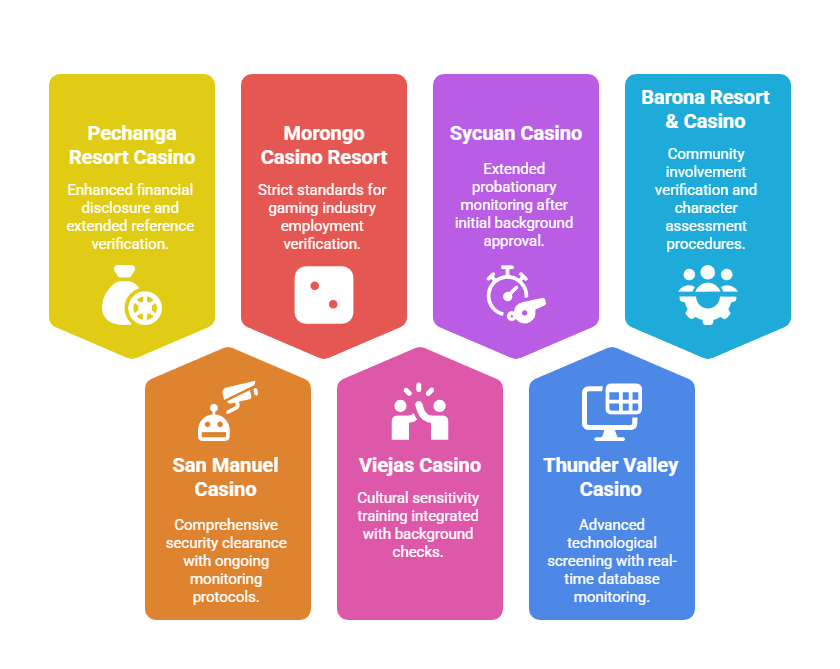
- Pechanga Resort Casino: Enhanced financial disclosure requirements and extended reference verification periods
- San Manuel Casino: Comprehensive security clearance procedures with ongoing monitoring protocols
- Morongo Casino Resort: Strict standards for gaming industry employment verification and performance history
- Viejas Casino: Cultural sensitivity training integration with background check completion requirements
- Sycuan Casino: Extended probationary monitoring periods following initial background approval
- Thunder Valley Casino: Advanced technological screening methods with real-time database monitoring
- Barona Resort & Casino: Comprehensive community involvement verification and character assessment procedures
The variation in tribal screening approaches reflects different cultural priorities and operational security needs across California's diverse tribal gaming market.
Federal Indian Gaming Regulatory Act Compliance
All tribal gaming operations must meet minimum background check standards established by the Indian Gaming Regulatory Act, including criminal history checks, credit investigations, and character references. These federal requirements ensure consistent baseline screening regardless of tribal-specific variations. The National Indian Gaming Commission provides oversight and technical assistance to tribal gaming authorities, helping maintain investigation quality and consistency across different tribal jurisdictions.
This federal involvement ensures that tribal casino background checks meet or exceed standards applied to state-regulated gaming facilities. Consequently, tribal gaming employees receive screening comparable to state-licensed gaming personnel while benefiting from additional tribal-specific protections and considerations.
Federal compliance requirements include regular auditing of tribal gaming authority screening procedures and ongoing training for investigative personnel. The National Indian Gaming Commission works closely with tribal authorities to ensure evolving security threats and regulatory changes are addressed promptly across all tribal gaming operations.
Tribal Sovereignty and Enhanced Standards
Many California tribes implement screening requirements that exceed federal minimums, reflecting their commitment to gaming integrity and community protection. These enhanced standards often include cultural competency assessments, community involvement verification, and additional character reference requirements. Tribal gaming authorities maintain discretion in establishing specific criteria that align with their cultural values and operational needs.
The sovereignty aspect allows tribes to implement innovative screening approaches while maintaining federal compliance. This flexibility enables tribal gaming authorities to address unique security concerns and community considerations not covered by standard regulatory frameworks. Some tribes have developed comprehensive employee mentorship programs that begin during the background check process and continue throughout employment.
Tribal gaming authorities often place special emphasis on community connections and cultural understanding during their screening processes. This approach helps ensure that employees understand and respect tribal values while maintaining the highest standards of gaming integrity and customer service.
Disqualifying Factors for California Casino Employment
California casino background checks focus on identifying specific risk factors that could compromise gaming integrity, patron safety, or regulatory compliance in 2025. Criminal history represents the most significant category of disqualifying factors, with particular emphasis on crimes involving dishonesty, violence, or gaming-related violations.
California gaming regulators also examine social media presence, public records, and other available information sources to assess character and suitability. This comprehensive approach helps identify potential risks that might not appear in traditional background check components. Recent regulatory updates have expanded scrutiny of online activities and digital footprints as part of comprehensive character assessment.
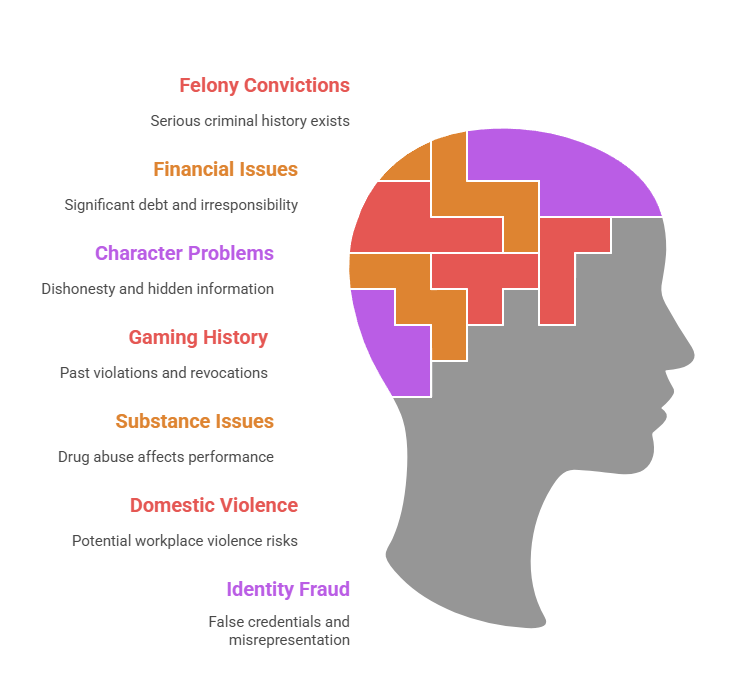
- Felony Convictions: Gaming violations, organized crime participation, money laundering, crimes against persons
- Financial Issues: Recent bankruptcies, significant unpaid debts, tax liens, patterns of financial irresponsibility
- Character Problems: Application dishonesty, undisclosed information, associations with prohibited persons
- Gaming History: License revocations, regulatory violations, terminations for cause from gaming facilities
- Substance Issues: Drug-related convictions, documented abuse affecting job performance
- Domestic Violence: Convictions or restraining orders indicating potential workplace violence risks
- Identity Fraud: False documentation, identity theft, or misrepresentation of credentials
The evaluation process considers rehabilitation efforts, time elapsed since problematic events, and evidence of character improvement when assessing potentially disqualifying factors.
Criminal History Evaluation
Gaming regulators evaluate criminal history based on offense severity, time elapsed since conviction, and evidence of rehabilitation efforts. Violent crimes and crimes involving dishonesty receive the most serious consideration, often resulting in permanent disqualification regardless of time elapsed. However, minor misdemeanors or older convictions may not disqualify candidates if they demonstrate rehabilitation and character improvement.
The evaluation process considers the relationship between criminal history and specific gaming position requirements. For example, financial crimes receive heightened scrutiny for positions involving cash handling or accounting responsibilities, while violence-related offenses are particularly concerning for customer-facing roles.
Gaming regulators also assess patterns of criminal behavior versus isolated incidents when evaluating applicant suitability. Multiple minor offenses may raise more concern than single serious incidents followed by demonstrated rehabilitation and law-abiding behavior over extended periods.
Financial Responsibility Assessment
Gaming employment requires demonstrating financial responsibility and stability, as financial distress can create vulnerability to theft or corruption. Credit history evaluation focuses on payment patterns, debt management, and overall financial decision-making rather than absolute credit scores. Recent bankruptcies or significant unpaid debts raise concerns about financial stability and potential security risks.
The assessment examines tax compliance, child support obligations, and other financial responsibilities that indicate character and reliability. Gaming regulators recognize that temporary financial difficulties may not indicate permanent character issues, particularly when accompanied by evidence of improvement efforts.
Financial responsibility evaluation includes review of gambling habits and any history of problem gambling behavior. Gaming employees must demonstrate ability to maintain appropriate boundaries between personal finances and workplace responsibilities in gaming environments.
Timeline and Process for California Gaming Background Checks
The California casino background check process typically spans 30-90 days depending on position level, applicant history complexity, and current processing volumes at regulatory agencies in 2025. Initial application submission begins the formal investigation process, triggering multi-jurisdictional database searches, reference contacts, and document verification procedures.
Complex cases involving extensive criminal history, multi-state residence patterns, or foreign background elements may require extended investigation periods. Gaming regulators prioritize thoroughness over speed, ensuring comprehensive evaluation of all relevant information. However, technological advances and improved inter-agency coordination have reduced average processing times compared to previous years.
| Processing Stage | Duration Range | Primary Activities |
| Application Review | 3-7 days | Completeness verification, fee processing, initial screening |
| Database Searches | 7-21 days | Criminal history, credit reports, regulatory databases, social media |
| Reference Verification | 10-30 days | Employment confirmation, character interviews, education verification |
| Investigation Analysis | 5-15 days | Comprehensive review, risk assessment, decision preparation |
| Final Approval | 2-10 days | Regulatory sign-off, license issuance, notification processes |
Processing efficiency varies among different gaming authorities and seasonal hiring volumes. Peak hiring periods may extend timelines, while experienced gaming professionals often receive expedited consideration.
Application Submission Requirements
Complete application submission requires extensive personal history documentation, including residential addresses for the past 10 years, employment history with supervisor contact information, and educational background verification. Applicants must provide multiple character references who can speak to their integrity, reliability, and suitability for gaming employment. Financial disclosure requirements include current debt obligations, bankruptcy history, and tax compliance documentation.
The application process increasingly utilizes electronic submission systems that streamline data collection and verification procedures. These technological improvements reduce processing delays while maintaining thoroughness and accuracy standards throughout the investigation.
Application requirements also include detailed disclosure of any criminal history, civil litigation involvement, and regulatory violations in any jurisdiction. Failure to disclose required information represents grounds for automatic disqualification regardless of the underlying issues' severity.
Investigation and Verification Procedures
Background investigators conduct comprehensive database searches across multiple jurisdictions, including criminal history, civil litigation, and regulatory violation databases. Reference verification involves detailed interviews with former employers, character references, and other individuals who can provide relevant information about applicant suitability. Financial verification includes credit report analysis, tax record review, and assessment of overall financial responsibility indicators.
The verification process may include field investigations for complex cases or high-level positions requiring enhanced security clearances. Gaming regulators coordinate with law enforcement agencies, other gaming jurisdictions, and federal databases to ensure comprehensive coverage of all relevant information sources.
Investigators also conduct social media reviews and internet searches to identify any publicly available information that might indicate character concerns or potential security risks. This comprehensive approach ensures thorough evaluation of all available information sources relevant to gaming employment suitability.
Cost Structure and Financial Responsibility
California casino background check costs vary significantly depending on investigation scope, position requirements, and specific gaming facility policies regarding fee responsibility in 2025. Many gaming establishments cover all background check costs as part of their recruitment process, viewing comprehensive screening as a necessary business investment.
Some gaming facilities implement cost-sharing arrangements where employees contribute to initial screening costs but receive reimbursement upon successful employment completion of specified periods. These arrangements balance cost management with candidate attraction considerations. Additionally, expedited processing options may incur supplemental fees for candidates requiring faster turnaround times.
| Cost Component | Price Range | Typical Responsibility |
| Application Processing Fee | $75-$200 | Usually employer-covered |
| Criminal History Searches | $100-$300 | Mixed arrangement |
| Credit Report and Financial Review | $50-$150 | Often employee-paid |
| Reference Verification Services | $150-$400 | Usually employer-covered |
| Regulatory Filing and License Fees | $125-$600 | Varies by facility policy |
| Expedited Processing Surcharge | $200-$500 | Generally employee-paid |
Cost responsibility policies vary among different gaming establishments and may change based on labor market conditions and hiring volume requirements. Candidates should clarify fee responsibility during initial employment discussions to avoid unexpected expenses.
Employer-Sponsored Background Checks
Many major casino operators cover all background check costs as part of their standard hiring process, recognizing that comprehensive screening protects their business interests and regulatory compliance. Employer-sponsored screening typically applies to all position levels and includes expedited processing when operationally necessary. This approach helps attract qualified candidates while ensuring thorough evaluation of all potential employees.
Employer-sponsored programs often include ongoing monitoring services and license renewal processing as part of comprehensive employee management systems. These programs demonstrate organizational commitment to regulatory compliance and employee development throughout their gaming careers.
Large casino operators frequently negotiate volume discounts with background check providers, reducing per-employee costs while maintaining comprehensive screening standards. These cost efficiencies allow employers to cover screening expenses without significantly impacting hiring budgets.
Employee Cost-Sharing Programs
Some gaming facilities implement cost-sharing programs where employees contribute to background check expenses, particularly for entry-level positions with high turnover potential. These programs typically require upfront payment with reimbursement after successful completion of probationary periods. Cost-sharing arrangements help manage hiring expenses while encouraging employee commitment to long-term employment.
Employee contributions generally cover standard screening components while employers fund enhanced investigations for positions requiring comprehensive security clearances. This balanced approach ensures thorough screening while managing costs effectively for both parties.
Cost-sharing programs often include flexible payment options and financial assistance for qualified candidates experiencing temporary financial constraints. Gaming establishments recognize that excessive upfront costs can prevent qualified candidates from pursuing gaming employment opportunities.
Preparation Strategies for Background Check Success

Successful navigation of California casino background check processes requires careful preparation, complete honesty, and proactive management of potential issues in 2025. Document organization becomes crucial for managing the extensive information requirements typical of gaming background checks.
Professional consultation may be valuable for applicants with complex backgrounds involving criminal history, financial problems, or other potential disqualifying factors. Preparation should begin several months before intended application submission to allow time for addressing potential issues and organizing required documentation.
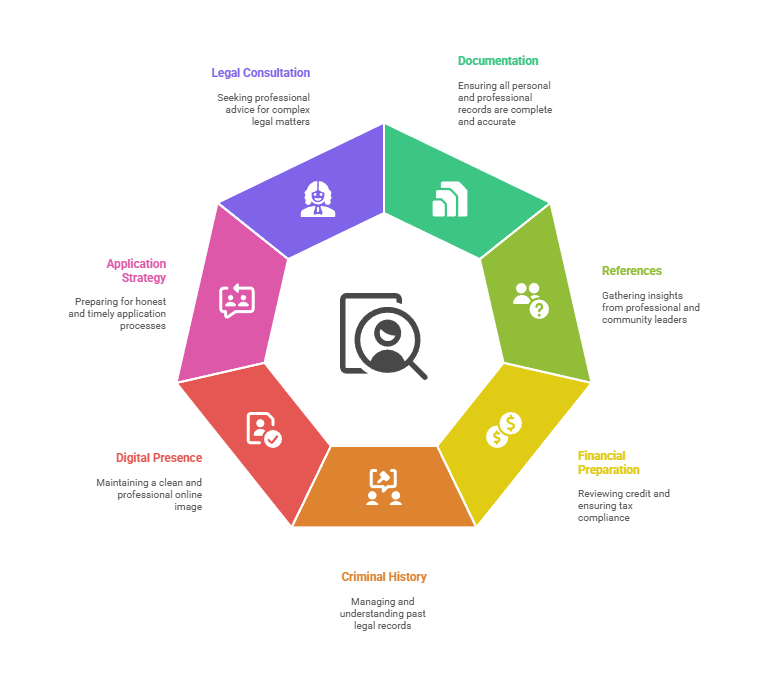
- Complete Documentation: Personal history records, employment verification, educational transcripts, reference contact information
- Character Reference Strategy: Professional references, community leaders, former supervisors, character witnesses
- Financial Preparation: Credit report review, debt resolution planning, tax compliance verification
- Criminal History Management: Court records compilation, rehabilitation evidence, legal consultation if needed
- Digital Presence Review: Social media cleanup, online reputation management, professional profile optimization
- Application Strategy: Honest disclosure preparation, timeline management, follow-up procedures
- Legal Consultation: Professional guidance for complex situations, appeals preparation, rights understanding
Research into tribal gaming authority priorities or specific casino company values demonstrates commitment and cultural alignment with organizational objectives.
Documentation and Record Organization
Comprehensive record organization streamlines the application process and demonstrates professionalism to background investigators. Applicants should maintain detailed files including employment records with supervisor contact information, educational transcripts, residential history documentation, and legal records if applicable. Digital organization systems help manage extensive documentation requirements while ensuring easy access during the application process.
Preparation should include verification of all contact information for references and former employers to prevent processing delays. Proactive communication with references about timing expectations and potential investigator contact helps ensure positive cooperation during the verification process.
Documentation organization should include backup copies of all critical documents and alternative contact methods for references who might be difficult to reach. Thorough preparation prevents delays and demonstrates organizational skills valued by gaming employers.
Disclosure Strategy and Transparency
Honest disclosure of potentially problematic information allows gaming regulators to evaluate circumstances fairly rather than discovering issues independently. Effective disclosure includes context, rehabilitation efforts, and evidence of character improvement since any problematic events occurred. Transparency demonstrates integrity and reliability, which are essential characteristics for gaming employment consideration.
Disclosure strategy should include legal consultation for complex criminal history situations to ensure complete and appropriate information presentation. Professional guidance helps applicants understand regulatory priorities and present their backgrounds in the most favorable light while maintaining complete honesty.
Successful disclosure strategies emphasize personal growth, lessons learned, and positive changes implemented following any problematic events. Gaming regulators appreciate candidates who demonstrate accountability and genuine commitment to personal improvement and professional excellence.
Appeals and Reconsideration Process
Gaming applicants who receive adverse background check decisions may have appeal rights depending on the specific regulatory authority and circumstances involved in 2025. Understanding appeal procedures helps candidates explore all available options for addressing negative decisions.
Appeal success depends heavily on the specific circumstances of each case and the quality of supporting documentation provided. Gaming regulators maintain discretion in evaluating appeals and generally focus on public safety and gaming integrity considerations when making final determinations.
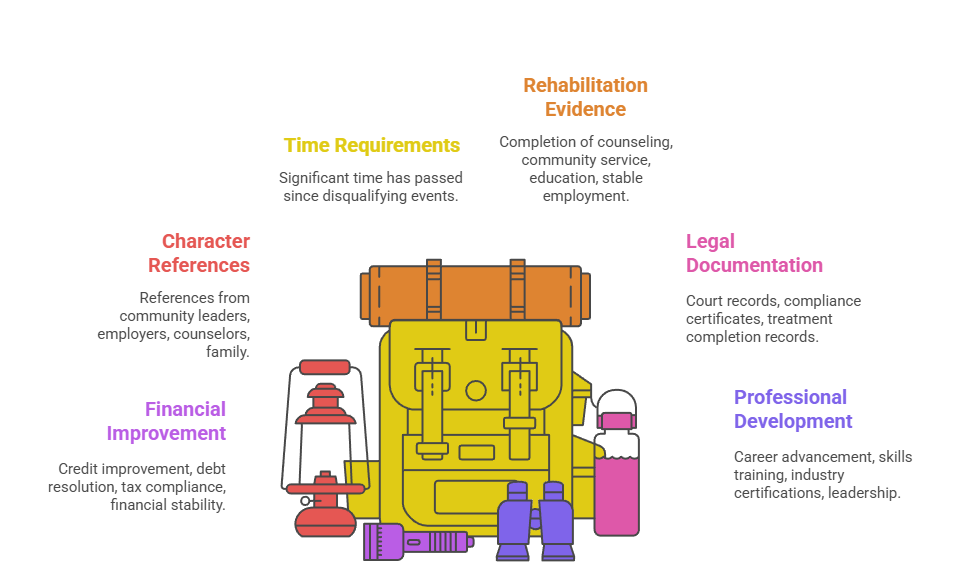
- Time Requirements: Significant passage of time since disqualifying events occurred
- Rehabilitation Evidence: Counseling completion, community service, educational achievements, stable employment
- Character References: Community leaders, employers, counselors, family members with credible standing
- Legal Documentation: Court records, compliance certificates, treatment completion records
- Financial Improvement: Credit improvement, debt resolution, tax compliance, financial stability demonstration
- Professional Development: Career advancement, skills training, industry certifications, leadership experience
Gaming regulators appreciate comprehensive appeal presentations that address underlying issues while demonstrating genuine commitment to personal and professional growth.
Formal Appeal Procedures
Formal appeals require written submissions with comprehensive supporting documentation within specified timeframes after adverse decisions. Appeal documentation should address each disqualifying factor specifically with evidence of rehabilitation, character improvement, and current suitability for gaming employment. Professional legal representation often improves appeal presentation quality and addresses complex regulatory requirements effectively.
The formal appeal process includes review by different personnel than those involved in initial decisions, providing fresh perspective on applicant qualifications. Appeal hearings may be available for certain cases, allowing applicants to present their cases directly to regulatory decision-makers.
Formal appeals must demonstrate changed circumstances or new information not available during initial screening processes. Gaming authorities generally require substantial evidence of rehabilitation and character improvement to justify reversing adverse decisions.
Alternative Resolution Options
Some gaming authorities offer alternative resolution options including conditional licensing, probationary employment periods, or restricted access clearances for applicants with minor disqualifying factors. These alternatives allow employment opportunities while maintaining enhanced monitoring and evaluation procedures. Conditional arrangements often include regular review periods and specific performance requirements.
Alternative resolutions provide pathways for employment while addressing regulatory concerns about specific risk factors. Success in alternative programs can lead to full clearance and standard employment status over time with demonstrated compliance and performance.
Alternative resolution options may include mentorship programs, enhanced training requirements, or community service obligations as conditions of employment approval. These creative approaches help qualified candidates overcome minor obstacles while maintaining gaming integrity standards.
Ongoing Compliance and Monitoring Requirements
California gaming employees must maintain ongoing compliance with regulatory standards throughout their employment, not just during initial background screening in 2025. Gaming authorities implement continuous monitoring systems that identify potential issues arising after initial employment approval.
Gaming establishments also maintain responsibility for monitoring employee compliance and reporting concerns to appropriate regulatory authorities. This shared responsibility system ensures comprehensive oversight of gaming operations while providing due process protections for employees facing potential compliance issues.
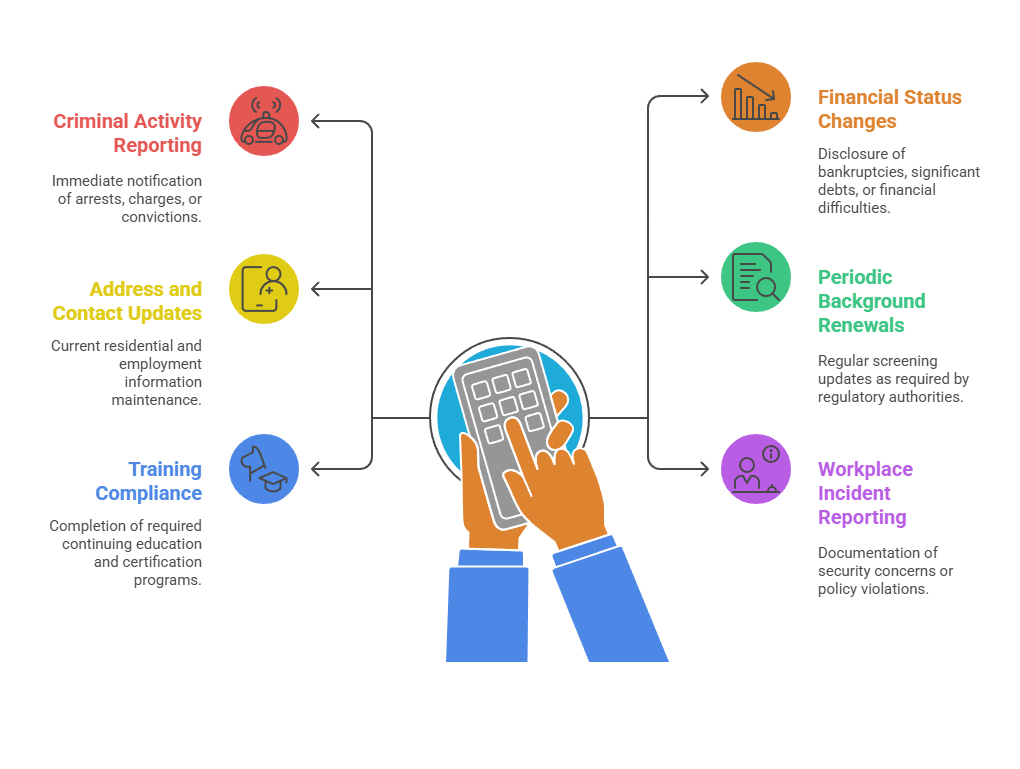
- Criminal Activity Reporting: Immediate notification of arrests, charges, or convictions
- Financial Status Changes: Disclosure of bankruptcies, significant debts, or financial difficulties
- Address and Contact Updates: Current residential and employment information maintenance
- Periodic Background Renewals: Regular screening updates as required by regulatory authorities
- Training Compliance: Completion of required continuing education and certification programs
- Workplace Incident Reporting: Documentation of security concerns or policy violations
Ongoing compliance creates a framework for maintaining gaming integrity while supporting employee career development and professional growth within the industry.
Continuous Monitoring Systems
Gaming authorities utilize sophisticated monitoring systems that track employee compliance with regulatory standards throughout their careers. These systems include automated database searches that identify new criminal activity, civil litigation, or other events that might affect employment eligibility. Real-time monitoring helps ensure prompt identification and resolution of potential compliance issues.
Monitoring systems also track professional development, training completion, and career advancement within the gaming industry. This comprehensive approach supports both regulatory compliance and employee career growth through documented professional achievement records.
The monitoring process includes regular reviews of employee performance records and any workplace incidents that might indicate compliance concerns or professional development needs.
Employee Responsibilities and Rights
Gaming employees have specific responsibilities for maintaining compliance with regulatory standards while also enjoying certain rights and protections under gaming regulations. Employee responsibilities include honest reporting of relevant changes in circumstances and cooperation with regulatory investigations or compliance reviews. However, employees also have rights to due process, privacy protections, and fair treatment during compliance procedures.
Understanding both responsibilities and rights helps gaming employees navigate ongoing compliance requirements while protecting their professional interests and career advancement opportunities. Gaming authorities provide guidance and support resources to help employees meet compliance obligations successfully.
Employee rights include access to their regulatory files, opportunities to address compliance concerns, and protection against discrimination based on regulatory status or background check outcomes.
Conclusion
California casino background check requirements reflect the gaming industry's commitment to integrity, security, and regulatory compliance through comprehensive employee screening processes in 2025. Success requires understanding the dual regulatory framework of state and tribal oversight, preparing thoroughly for extensive investigation procedures, and maintaining complete honesty throughout the process. Job seekers who invest time in proper preparation, document organization, and understanding of specific gaming facility requirements position themselves for successful outcomes in California's competitive gaming employment market. The investment in comprehensive background check preparation pays dividends through access to stable, well-compensated careers in one of California's largest entertainment industries, while ongoing compliance ensures continued professional success and career advancement opportunities.
Frequently Asked Questions
How long does a California casino background check take?
California casino background checks typically take 30-90 days depending on the position level and investigation complexity. Entry-level positions may complete screening in 30-45 days, while management roles requiring comprehensive investigations can take 60-90 days. Processing times may extend for applicants with complex history or multi-jurisdictional residence patterns.
What disqualifies you from casino employment in California?
Major disqualifying factors include felony convictions (especially involving gaming, fraud, or violence), significant financial problems like recent bankruptcies or unpaid tax liens, associations with organized crime, previous gaming license revocations, and dishonesty in application materials. Each case receives individual evaluation based on specific circumstances and position requirements.
Do California casinos check credit history?
Yes, California casino background checks include comprehensive credit history reviews examining credit reports, debt-to-income ratios, bankruptcies, tax liens, and patterns of financial responsibility. Gaming positions involving cash handling or financial access receive particular scrutiny regarding credit history and financial stability.
Can you work at a California casino with a criminal record?
Employment possibility with a criminal record depends on the specific crimes, time elapsed, evidence of rehabilitation, and position requirements. Minor misdemeanors or older convictions may not disqualify candidates, while felonies involving dishonesty or violence typically result in permanent disqualification from gaming employment.
Do tribal casinos have different background check requirements?
Yes, tribal casinos operate under federal oversight combined with individual tribal authority requirements, creating variation in background check procedures. While federal minimums ensure baseline standards, individual tribes may implement additional screening requirements, different timelines, or specific cultural considerations beyond state-regulated facilities.
Who pays for California casino background checks?
Background check cost responsibility varies by gaming facility and position level. Many casinos cover all investigation costs as part of recruitment, while others require employee contribution ranging from $200-$800. Higher-level positions typically receive employer-covered screening due to strategic hiring considerations and candidate attraction needs.
Additional Resources
- California Gambling Control Commission Official Guidelines
https://www.cgcc.ca.gov/ - National Indian Gaming Commission Background Check Requirements
https://www.nigc.gov/ - California Gaming Employment Opportunities Database
https://www.calgaming.org/careers - Indian Gaming Association of California
https://www.indiangaming.org/ - California Casino Background Check Legal Guide
https://www.casinoemploymentlaw.com/background-checks - Federal Gaming Employment Regulations Overview
https://www.ecfr.gov/title-25/chapter-III
Still have questions?
Get in touch with our team today for a personalized demo and discover how our tailored volume pricing and packages can drive results for your business!
How useful was this page?*
Note: your comments are anonymous. We use them to improve the website. Do not include any personal details.
Visit our FCRA Compliance Tool or leave a message here if you need a response.
From the blog Explore the GCheck Content Hub

How Long Do Background Checks Take for Government Jobs? Timeline Expectations for 2026
6 Jan, 2026 • 20 min read
Driver Qualification File Requirements: Your Complete DOT Compliance Guide
6 Jan, 2026 • 18 min read
Healthcare Background Screening Costs: 2026 Budget Planning Guide for Medical Facilities
30 Dec, 2025 • 23 min readThe information provided in this article is for general informational and educational purposes only and should not be construed as legal advice or a substitute for consultation with qualified legal counsel. While we strive to ensure accuracy, employment screening laws and regulations—including but not limited to the Fair Credit Reporting Act (FCRA), Equal Employment Opportunity Commission (EEOC) guidelines, state and local ban-the-box laws, industry-specific requirements, and other applicable federal, state, and local statutes—are subject to frequent changes, varying interpretations, and jurisdiction-specific applications that may affect their implementation in your organization. Employers and screening decision-makers are solely responsible for ensuring their background check policies, procedures, and practices comply with all applicable laws and regulations relevant to their specific industry, location, and circumstances. We strongly recommend consulting with qualified employment law attorneys and compliance professionals before making hiring, tenant screening, or other decisions based on background check information.

